WCER Evaluators Find Literacy Program for Low-Income Kids Creates ‘Safe Place’ for Learning
Odyssey Junior, a Campus-Community Hybrid, Seeks Continuous Improvement, 'Whole-Family Learning', with WEC's Help
April 25, 2019 | By Karen Rivedal

Madison poet Fabu interacts with Odyssey Junior participants Angel, left, and Rahqayyah, right, during a visit to the program.
A literacy and arts enrichment program for low-income children aged 2-18 in Madison is a force for good mainly because it creates a ‘safe place’ for participants to take risks and learn to express themselves, according to program evaluation experts at UW-Madison.
Known as Odyssey Junior, the program works because its welcoming atmosphere allows children to build self-confidence and become more self-reliant. Those are empowering characteristics that create hope for the future as readily as the love of reading that program instructors work to instill each week, evaluators from the Wisconsin Center for Education Research within the School of Education found.
“It’s about advocating for themselves -- speaking up, finding their voice, helping them pursue goals they might otherwise have felt were not within their reach,” says Robin Worth, a principal investigator at WCER’s Wisconsin Evaluation Collaborative (WEC), which conducts evaluations of programs, curricula and initiatives serving students in the state’s preK-12 educational system and in the community.
“It’s hoping to instill in students the capacity to see more options, more possibilities – opening the skies to them,” says Associate Researcher Jessica Arrigoni, who led the evaluation of Odyssey Junior for WEC. “Some of them may not have thought that far along due to their age or circumstances.”
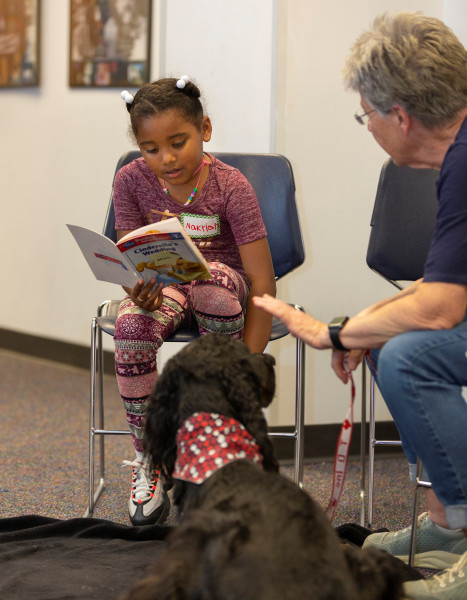
Nakyiah, age 6, reads to Rocky the dog to build confidence in her reading skills.
Odyssey Junior is something of a campus-community hybrid, run by faculty and staff in UW-Madison’s Department of Continuing Studies but offered at the Villager Mall on Madison’s South Side with the support of grants, donations and volunteers. Students meet one night a week for an academic year and also are offered homework help and tutoring twice a week.
“Odyssey Junior reintroduced me to reading,” one participant told evaluators, while another shared: “I like reading more, learning new words.”
Begun in 2015, the program serves 50 to 60 students annually. This year’s class wraps up May 1 with a graduation ceremony for families and staff.
Fighting poverty with ‘whole-family’ learning
Odyssey Junior grew out of a related program offered at the same time and location known as the Odyssey Project Course, which started in 2003. Aimed at low-income adults who face a variety of barriers to higher education such as being new to this country and/or having a history of addiction, homelessness, depression, domestic violence or incarceration, the adult program offers 30 students per year a path to college through a six-credit, interdisciplinary humanities course and wrap-around assistance, such as academic and financial advising and money for unexpected emergencies.
Odyssey Junior participants must be the children or grandchildren of current Odyssey Course students or alumni. Known collectively as the Odyssey Project, the programs, offered free to participants, help the Odyssey team better realize their overarching goal of breaking the cycle of poverty through higher education by working with multiple generations of a family at the same time, according to director and co-founder Emily Auerbach, a professor of English in Continuing Studies.
“The importance of a whole-family approach is key,” she says, “bringing families together around the excitement of learning, and making sure we don’t have any children who think they’re not college-bound.”
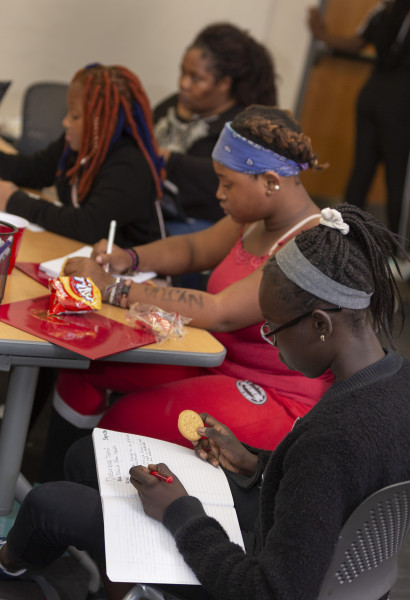
Nyjua, in red, and Zawadi, holding cracker, write in journals as part of an Odyssey Junior exercise.
“They come from a background where they may not have had the same opportunities as other kids in the school system,” Auerbach adds. “They may be questioning their identity and wondering about their future. Some are reading below grade-level or may be really shy. Our goal is to overcome that.”
And because the participants already attend classes during the day, the instructors in Odyssey Junior’s three classrooms, grouped by grade ranges, try not to make the program feel too much like regular school.
“It’s about learning, but it’s active learning,” Arrigoni says. “They bring in amazing speakers, and they take them on field trips. The students write in journals and produce newsletters.”
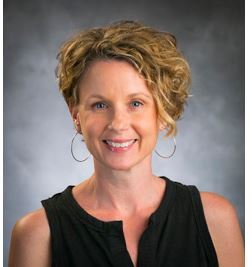
Arrigoni
For example, younger students in the program always visit the Madison Children’s Museum, and then write about it, Auerbach says, while teens take a trip to the Chazen Museum of Art on campus. Teens also have visited the Overture Center to work with theater groups while younger kids have taken tours of the UW-Madison Geology Museum.
One of the most popular program visitors is the Alliance of Therapy Dogs, which offers its “Read to a Dog” program several times each year, allowing both older and younger students to build confidence by reading parts of their favorite books to the patient pooches, Auerbach says. Guests including former Madison Poet Laureate Fabu and members of the Madison Reading Project also make frequent visits.
“It’s more than just putting in time with children,” Auerbach says. “It’s trying actively to get them involved with language.”
What the evaluation found
Early indications suggest the program is achieving its goals, both practical and aspirational. Since 2016, WEC’s continuing evaluation of Odyssey Junior has found the program helps many participants:
- Strengthen their writing skills.
- Increase their interest in reading.
- Express themselves and explore who they are and what they value.
- Develop their educational goals.
“Students now talk about ‘when,’ rather than ‘if,’ they go to college,” the evaluation reports.
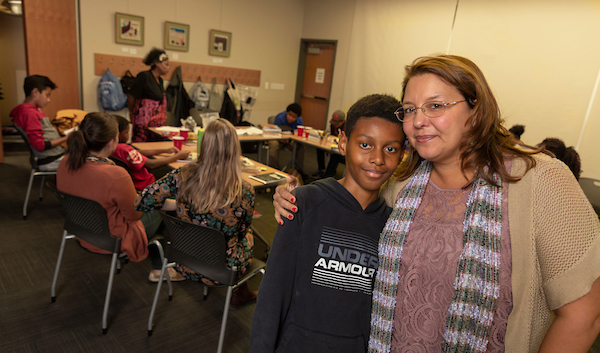
Demonstrating the program’s intergenerational impact, Hedi Rudd, an alumna of the adult Odyssey program, hugs her grandson, Elijah Brown, 12, a member of the current Odyssey Junior class. Rudd, a Madison photographer and storyteller, is also this year’s winner of the city’s Nan Cheney March for Justice award.
A sampling of images and writing from the Odyssey Junior Oracle newsletter from 2015-2018 shows how the program was helping students open their minds to possibilities. On a page titled, “Envisioning the Future,” several students in the program did just that for themselves:
“I want to be the first in my family to graduate from a Division 1 college or university, or maybe working with kids that are living in poverty and inventing something to help the black community,” Jaquez said.
“My name is Antonio,” shared another. “In eight years I will try to solve the problem of pollution by planting more trees, driving a car less often or selling my car.”
Auerbach says the evaluation shows Odyssey Junior seems to be achieving its goal of providing a “safe, warm and nurturing community” that “embraces diversity” and makes children feel “they matter.”
“Working well in Odyssey Junior is the sense of belonging,” Auerbach says. “That’s the part I’m the most excited about: helping children find their voices.”
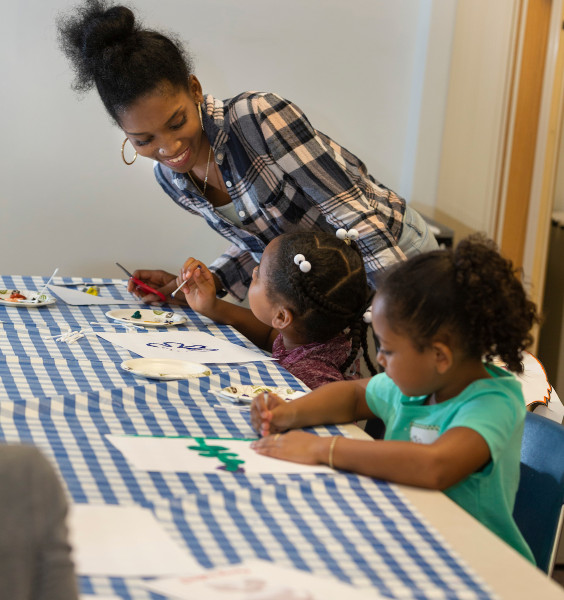
Odyssey Junior volunteer and adult Odyssey program alumna Kyisha, left, works with her daughter Nakyiah and niece Layla, in green shirt. The program has eight alumnis working or volunteering in Odyssey Junior.
Arrigoni agrees, noting, “That safe place really allows them to develop their self-confidence, and then they can practice speaking and writing and all of those skills.”
Evaluators also learned how program benefits for students extended beyond Odyssey Junior classrooms.
“It made me feel confident to read in front of my entire class (at school) because we do it at Odyssey,” one Odyssey Junior student said in the evaluation.
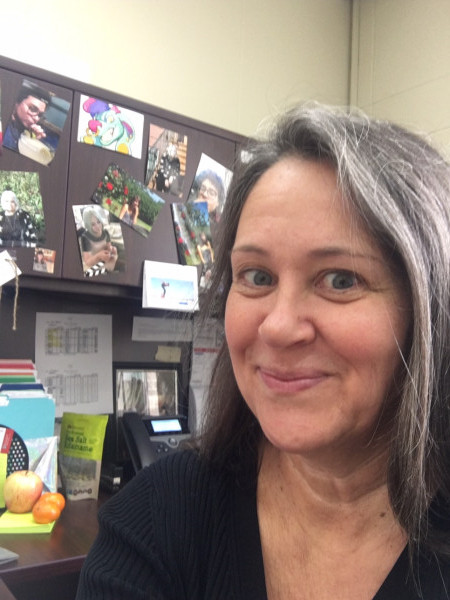
Worth
“We heard powerful stories about how the program changed people’s lives,” Worth adds, “how that one night a week helped them come out of their shell, and talk to people, and feel more involved in their regular schools as well, and how they were less nervous or afraid outside class, too.”
Challenges were identified in the evaluation as well. To continue improving the program, evaluators recommended program leaders continue prioritizing its efforts to build community within and across the three classrooms -- respectively, for children age 2-kindergarten, grades 1-5 and grades 6-12. They also said leaders should further refine program goals and objectives, make sure everyone understands them, and work to more deliberately align weekly activities to goals, especially in the teaching of self-efficacy.
How the evaluation was done
For each of the past three program years, evaluators have surveyed and interviewed students, parents and program instructors, observed classroom activities and reviewed lesson plans.
“Often what we’ll do (in evaluations) is just go in and look to see, ‘Are you doing what you think you’re doing and what you say you’re doing?’” Worth says. “What are the pieces and how do they align?”
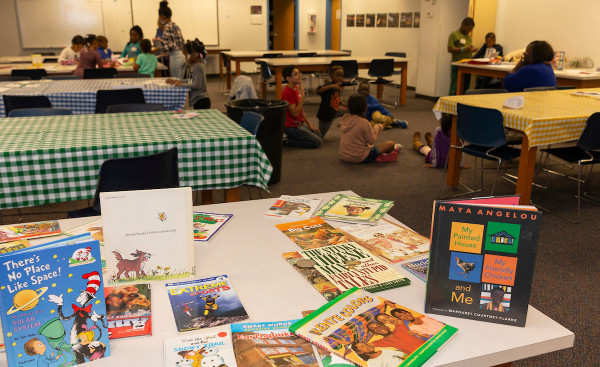
Every Odyssey Junior participant receives new books.
“We had to learn about the program,” Arrigoni says. “We had to get to know the staff and go in and observe at all the different levels. We did a survey for the older kids that was a little more open-ended, where they could write a little bit more. And then for the younger kids, because they needed someone to sit with them, it was more like an interview, where we were asking them the survey questions.”
Evaluators also worked with Odyssey Junior leaders to develop the questions, even as they took steps to progressively help the leaders learn how to do their own program evaluations going forward. That’s important for community-based organizations, which tend to lack large operating budgets.
“Obviously they want to spend their money on their program and the kids,” Arrigoni says, even as she and Worth hope the evaluations help them develop a “continuous improvement mindset.”
WEC researchers did the Odyssey Junior evaluation for program years 2016-17 and 2017-18, but it doesn’t end there. They are continuing to evaluate the program in the current academic year.
“It’s helping Odyssey Junior get started,” Worth notes. “The idea is to give formative feedback as the program grows. And a big hat’s off to Odyssey leaders for thinking of evaluation, because they have so many plates spinning and that’s just one more thing to need to do.”
Why they took the job
Arrigoni and Worth see working with the Odyssey Project as a form of Wisconsin Idea-style outreach to marginalized communities, due to the programs’ emphasis on low-income populations, including people of color and recent immigrants, who they could help become the first in their families to attend college.
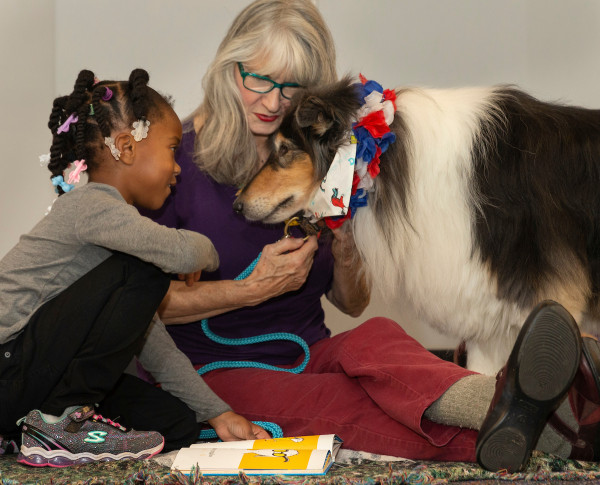
Six-year-old Essence takes a break from reading her favorite book to Danny and his handler, Stephanie.
The work also offers an element of professional development, as Worth and Arrigoni learn to use their skills outside the traditional school classrooms where they typically work.
“The community group factor makes it interesting and challenging,” Arrigoni says. “We have to think in different ways, of different measures we can use to do evaluation work in a unique setting.”
Also significant is the heightened appreciation for the struggles and successes of students outside the mainstream that the alternative setting provides.
“You’re getting insight into people’s lives in a different context than what it looks like in a traditional school,” Worth says. “It helps me keep that social justice and equity focus uppermost in my mind, and it’s a powerful reminder for me not to slip back into these implicit biases or assumptions about students.”
Worth and Arrigoni also believe in the Odyssey Project’s intergenerational impact as a way to help break the cycle of poverty and foster love of learning for parents and children.
“It’s changing the nature of conversations that are going on in homes,” Worth says.
“The programs build on each other, and it’s instilling that whole big picture -- this principle that education is important and that it’s going to open these doors,” Arrigoni says.
To learn more about the Odyssey Project or Odyssey Junior, see the Odyssey Project website. Contact Emily Auerbach at 608-262-3733, Emily.auerbach@wisc.edu.


